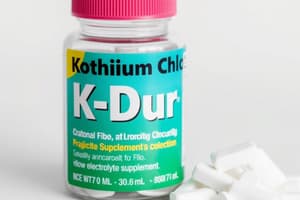Podcast
Questions and Answers
Which of the following are trade names for Potassium Chloride?
Which of the following are trade names for Potassium Chloride?
- Ibuprofen
- Cena-K (correct)
- K+Care (correct)
- Klor-Con (correct)
What classification does Potassium Chloride fall under?
What classification does Potassium Chloride fall under?
- Pain reliever
- Antihistamine
- Mineral and electrolyte replacements/supplements (correct)
- Antibiotic
What is the therapeutic action of Potassium Chloride?
What is the therapeutic action of Potassium Chloride?
Replacement and prevention of deficiency
Which of the following are potential side effects of Potassium Chloride?
Which of the following are potential side effects of Potassium Chloride?
What should be assessed for during the nursing implications of Potassium Chloride?
What should be assessed for during the nursing implications of Potassium Chloride?
What vital signs should be monitored periodically during IV therapy of Potassium Chloride?
What vital signs should be monitored periodically during IV therapy of Potassium Chloride?
What symptoms indicate toxicity of Potassium Chloride?
What symptoms indicate toxicity of Potassium Chloride?
What is a potential nursing diagnosis for someone receiving Potassium Chloride?
What is a potential nursing diagnosis for someone receiving Potassium Chloride?
It is safe to administer K IV push or bolus.
It is safe to administer K IV push or bolus.
How should effervescent Potassium Chloride tablets be administered?
How should effervescent Potassium Chloride tablets be administered?
Flashcards are hidden until you start studying
Study Notes
Potassium Chloride Overview
- Generic and trade names include Cena-K, Gen-K, K+Care, K-Dur, Klor-Con, Micro-K, and many others.
- Classified under therapeutic drugs for mineral and electrolyte replacements/supplements.
Therapeutic Action
- Primarily used for the replacement and prevention of potassium deficiency.
Side Effects
- CNS: confusion, restlessness, weakness.
- CV: arrhythmias and ECG changes.
- GI: abdominal pain, diarrhea, flatulence, nausea, vomiting; tablets/capsules may cause ulcers or lesions.
- Local: irritation at IV site.
- Neuro: paralysis and paresthesia.
Nursing Implications - Assessment
- Evaluate for signs and symptoms of hypokalemia and hyperkalemia.
- Monitor pulse, blood pressure, and ECG during IV therapy.
- Check serum potassium, renal function, bicarbonate levels, and pH regularly.
- Assess magnesium levels in cases of refractory hypokalemia.
- Watch for hypochloremia when replacing potassium without chloride.
Toxicity and Overdose
- Symptoms of toxicity mirror hyperkalemia.
- Treatment includes discontinuing potassium, administering sodium bicarbonate for acidosis, giving dextrose and insulin to help move potassium into cells, and possibly dialysis for renal impaired patients.
Potential Nursing Diagnoses
- Imbalanced nutrition; less than body requirements.
Implementation Considerations
- High alert for medication errors related to rapid IV infusion or bolus administration of KCl.
- Avoid confusing K-Dur with Imdur and Micro-K with micronase.
- For renal tubular acidosis, consider alternative salts like potassium bicarbonate.
- If hypokalemia results from diuretics, adjust dosage appropriately unless arrhythmias or digitalis therapy is a concern.
- To reduce GI irritation, administer potassium chloride with or after meals.
- Tablets and capsules reserved for patients intolerant to liquids; take with water.
Administration Guidelines
- Effervescent tablets should dissolve in 3-8 oz of cold water.
- Powders and solutions must be diluted in a similar volume before ingestion.
- Enteric-coated or extended-release tablets must not be chewed or crushed; Micro-K ExtenCaps can be sprinkled on soft food.
- Monitor for extravasation to prevent severe pain and tissue necrosis.
- Never administer potassium IV push or bolus; lethal results have occurred with incorrect administration.
- Continuous infusion must not exceed concentrations of 1.5 mEq/ml undiluted to avoid fatalities.
Studying That Suits You
Use AI to generate personalized quizzes and flashcards to suit your learning preferences.




